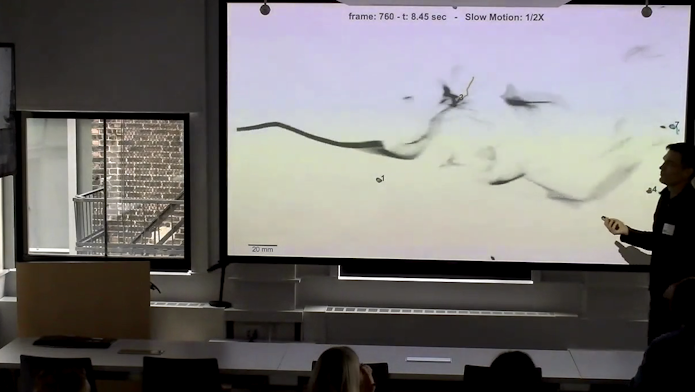Topic: Conflicts and synergies between individuality and collective behavior
Cells live in communities where they interact with each other and their environment. By coordinating individuals, such interactions often result in collective behavior that emerges on scales larger than the individuals that are beneficial to the population. At the same time, populations of individuals, even isogenicones, display phenotypic heterogeneity, which diversifies individual behavior and enhances the resilience of the population in unexpected situations. This raises a dilemma: although individuality provides advantages, it also tends to reduce coordination. I will report on our recent experimental and theoretical efforts that use bacterial chemotaxis as model system to understand, the origin of individual cellular behavior and performance, and how populations of cells reconciliate individuality with group behavior.
This study was supported by the National Institutes of Health grant R01GM106189, the AllenDistinguished Investigator Program (grant 11562) through The Paul G. AllenFrontiers Group, and the James S. McDonnell Foundation grant on Complexity.
Thierry Emonet is a Tenured Associate Professor of Molecular Cellular and Developmental Biology & Physics at Yale University. Thierry studied physics at the ETH Zürich, and received his Ph.D. in theoretical astrophysics from the University of La Laguna (Spain) in 1998, before doing postdocs at the National Center for Atmospheric Research, Boulder CO and The University of Chicago, discovering key mechanisms that enable the magnetic field to float to the surface of the Sun to create Sunspots. In 2002 Thierry switched to biology to study what computations biological systems perform and how they implement them. At Yale since 2007, his lab focuses on understanding how biological organisms sense their environment and use this information to make decisions and navigate the world. Central to this problem is the realization that decisions influence the stimuli experienced next (looking toward the sun floods your visual inputs; walking into a dark room removes them). Thus, an important component of signal processing studied in the Emonet lab is how the feedback of behavior onto the signal contributes to the computation performed by the organism. Another major area of research in the lab is to understand the functional role of noise and individual-to-individual variation in these processes. Thierry investigates these problems from the dual perspective of microbiology and neuroscience. As model systems, he uses chemical sensing and navigation in bacteria and insects. His lab probes these systems at the molecular, cellular, neural, and behavioral levels by combining molecular and biophysical experimental methods with predictions from theory and simulations. With this approach, Thierry’s goal is to discover general principles that explain how function at one scale (e.g. microbial population, brain) emerges from interactions and coordinated behavior at the smaller scale (e.g. molecules, cells, single neurons). His work is supported by NIH and NSF, and he has received awards from the Paul G Allen Family Foundation (Distinguished Allen Investigator), the Whitehall Foundation, the James S. McDonnell Foundation and the Alfred P. Sloan Foundation.
